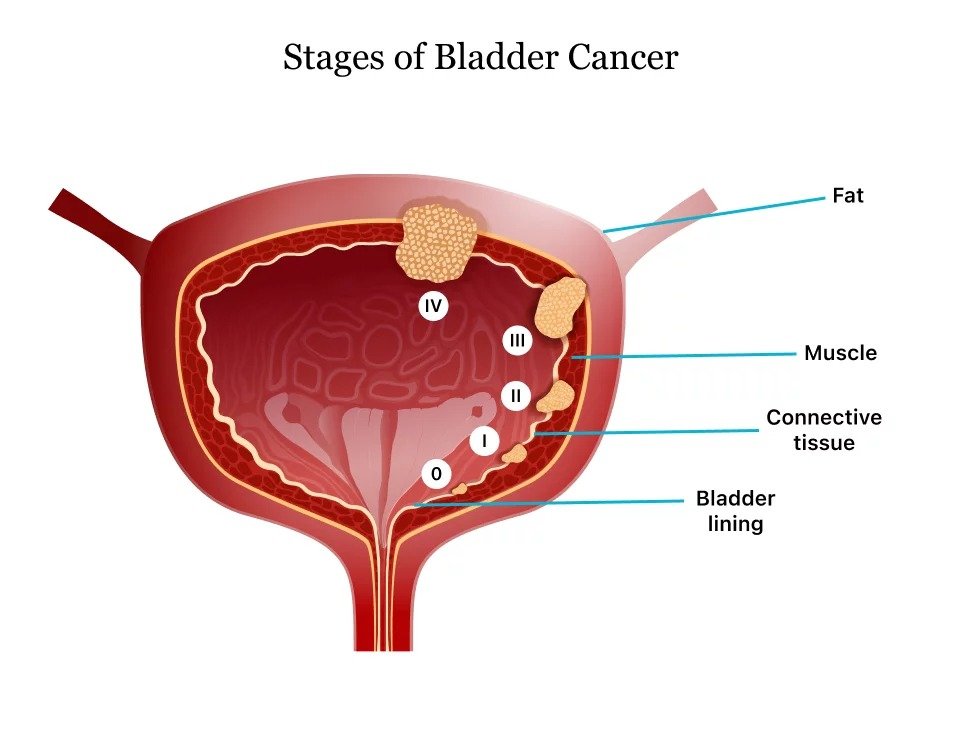Understanding Bladder Cancer: Types, Symptoms, and Treatment Options

Introduction:
Bladder cancer is a relatively common but often misunderstood form of cancer. It originates in the bladder, the organ responsible for storing urine, and can present in various ways. In this blog, we will explore the types and symptoms of bladder cancer, as well as the treatment options available.
Types of Bladder Cancer:
- Transitional Cell Carcinoma (TCC): This is the most common type of bladder cancer, accounting for approximately 90% of cases. It begins in the urothelial cells lining the bladder. TCC can be further categorized into non-invasive and invasive types.
- Non-Invasive TCC: In this less aggressive form, cancer cells are limited to the innermost layer of the bladder lining. Treatment typically involves transurethral resection (TURBT) to remove tumors, followed by periodic monitoring.
- Invasive TCC: Invasive TCC occurs when cancer cells penetrate the muscular layer of the bladder wall or spread to nearby tissues. Treatment may involve surgery, chemotherapy, and radiation therapy.
- Squamous Cell Carcinoma: This type of bladder cancer is less common, arising from flat, thin cells known as squamous cells. It is often associated with chronic irritation or infection and can be challenging to treat, especially when diagnosed at an advanced stage.
- Adenocarcinoma: Bladder adenocarcinoma is rare and originates in the glandular cells of the bladder lining. It tends to be aggressive and may require a combination of treatments, including surgery, chemotherapy, and radiation.
- Small Cell Carcinoma: The rarest type of bladder cancer, small cell carcinoma develops in neuroendocrine cells. It is highly aggressive and grows rapidly, making it difficult to treat effectively.
Symptoms of Bladder Cancer:Common symptoms of bladder cancer are
- Blood in urine (haematuria)
- Frequent urination
- Painful urination
- Lower back or abdominal pain
- Pelvic pain
- Changes in urinary habits
If you experience any of these symptoms, it is crucial to consult a healthcare professional for a proper evaluation.
Treatment Options:
The choice of treatment for bladder cancer depends on various factors, including the type and stage of cancer, overall health, and patient preferences. Common treatment methods include:
- Surgery: Depending on the stage and extent of cancer, surgical options may include transurethral resection (TURBT) for non-invasive tumors, partial or complete bladder removal (cystectomy), or lymph node removal.
- Chemotherapy: Chemotherapy drugs can be used before or after surgery to shrink tumors or target cancer cells that have spread. Intravesical chemotherapy, where medication is placed directly into the bladder, is also an option for non-invasive bladder cancer.
- Radiation Therapy: High-energy rays are used in radiation therapy to target and kill cancer cells. It can be employed as a primary treatment for patients who are not surgical candidates.
- Immunotherapy: Immune checkpoint inhibitors like pembrolizumab and atezolizumab are used to stimulate the immune system to fight cancer cells, particularly in advanced bladder cancer.
- Targeted Therapy: Targeted therapies focus on specific molecules involved in cancer growth. Drugs like erdafitinib are used for advanced bladder cancer with specific genetic mutations.
- Clinical Trials: Participation in clinical trials provides access to innovative treatments and therapies not yet widely available, contributing to the advancement of bladder cancer research.
In conclusion, bladder cancer presents in various types, each with its unique characteristics and challenges. Timely diagnosis and individualized treatment plans are essential for effectively managing bladder cancer and improving patient outcomes. If you or a loved one suspects bladder cancer, seek prompt medical attention to explore the best options for diagnosis and treatment.

